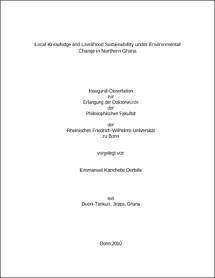Local Knowledge and Livelihood Sustainability under Environmental Change in Northern Ghana

Local Knowledge and Livelihood Sustainability under Environmental Change in Northern Ghana

| dc.contributor.advisor | Gerke, Solvay | |
| dc.contributor.author | Derbile, Emmanuel Kanchebe | |
| dc.date.accessioned | 2020-04-14T11:29:28Z | |
| dc.date.available | 2020-04-14T11:29:28Z | |
| dc.date.issued | 09.11.2010 | |
| dc.identifier.uri | https://hdl.handle.net/20.500.11811/4262 | |
| dc.description.abstract | One of the most daunting challenges of development in Sub-Saharan Africa, and northern Ghana in particular, is how to secure livelihoods for rural populations under environmental change. This dissertation explores how rural households utilize local knowledge as a strategic resource for reducing livelihood vulnerability to environmental change in the Atankwidi basin, north-eastern Ghana. A qualitative research approach was used for the collection of data from farmers, households and organizations. Combinations of purposive and systematic sampling methods were applied in selecting respondents. The methods of data collection included in-depth interviews, key informant interviews, group interviews, focus group discussions and observation. A household survey was conducted to complement other methods in data collection. Findings from the study show that rural households are reducing their livelihood vulnerability to environmental change through multiple local knowledge systems. These include: (1) livelihood diversification for reducing vulnerability to multiple environmental risks; (2) the application of local organic manure for reducing vulnerability to soil degradation in food crop farming; (3) cultivation of multiple farms combined with different rounds of seeding, cultivation of drought resistant traditional crops and adoption of early maturing crops for adapting farming to rainfall variability; (4) patterns in knowledge flows show that local knowledge flows easily within households, neighbourhoods and communities than between communities. However, inter-community flows are very important for innovations. For the most part, kinship, social networking and development agencies shape these patterns of local knowledge flows. Drawing on these findings, the main conclusion reached from this study is that the application of local knowledge in household economic production reduces livelihood vulnerability to environmental change in the Atankwidi basin, north-eastern Ghana. | en |
| dc.language.iso | eng | |
| dc.rights | In Copyright | |
| dc.rights.uri | http://rightsstatements.org/vocab/InC/1.0/ | |
| dc.subject | Umweltveränderungen | |
| dc.subject | Existenzgrundlage | |
| dc.subject | Vulnerabilität | |
| dc.subject | Anpassung | |
| dc.subject | Wissen um lokale Zusammenhänge | |
| dc.subject | Ghana | |
| dc.subject | environmental change | |
| dc.subject | livelihoods | |
| dc.subject | vulnerability | |
| dc.subject | adaptation | |
| dc.subject | local knowledge | |
| dc.subject.ddc | 300 Sozialwissenschaften, Soziologie, Anthropologie | |
| dc.title | Local Knowledge and Livelihood Sustainability under Environmental Change in Northern Ghana | |
| dc.type | Dissertation oder Habilitation | |
| dc.publisher.name | Universitäts- und Landesbibliothek Bonn | |
| dc.publisher.location | Bonn | |
| dc.rights.accessRights | openAccess | |
| dc.identifier.urn | https://nbn-resolving.org/urn:nbn:de:hbz:5-23362 | |
| ulbbn.pubtype | Erstveröffentlichung | |
| ulbbnediss.affiliation.name | Rheinische Friedrich-Wilhelms-Universität Bonn | |
| ulbbnediss.affiliation.location | Bonn | |
| ulbbnediss.thesis.level | Dissertation | |
| ulbbnediss.dissID | 2336 | |
| ulbbnediss.date.accepted | 25.10.2010 | |
| ulbbnediss.fakultaet | Philosophische Fakultät | |
| dc.contributor.coReferee | Evers, Hans-Dieter |
Dateien zu dieser Ressource
Das Dokument erscheint in:
-
E-Dissertationen (713)




